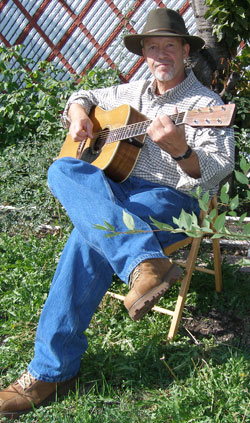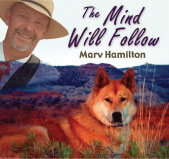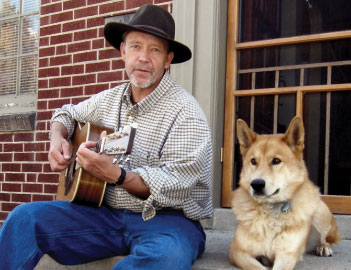
Of Heart and Mind
 Modern-day
Renaissance man Marv Hamilton is a peace activist, psychotherapist,
nature lover, social worker, singer-songwriter—and unabashed romantic. Modern-day
Renaissance man Marv Hamilton is a peace activist, psychotherapist,
nature lover, social worker, singer-songwriter—and unabashed romantic.
by Paul Swenson
So, what is the wiry, balding clinical social worker and psychotherapist
doing in the Wasatch Mountains with an audio recorder and a live microphone
hidden in a length of plastic PVC pipe?
If his name is Marvin “Marv” Hamilton BA’76 (English) BA’76 (Psychology)
MSW’83—the sole proprietor of Best Dog Records—he’s attempting to capture
the distinctive snare of a rattlesnake. Seeking live, natural sound,
he’ll go to any length to capture the perfect percussion for the mix
of a new song on the label’s latest release, The Mind Will Follow,
his second album on Best Dog Records (the first, Wing and a Prayer,
was released in 2001).
 Hamilton,
a Utah native, is a nationally acclaimed singer/songwriter (among the
finalists at the prestigious Kerrville Texas Folk Festival a few years
back), and he has just released a CD, which he created and produced.
But Hamilton is also an anomaly; his music suggests the human heart
is more vital to personal interaction than the human mind—where much
of his professional life has been focused while treating mental disorders. Hamilton,
a Utah native, is a nationally acclaimed singer/songwriter (among the
finalists at the prestigious Kerrville Texas Folk Festival a few years
back), and he has just released a CD, which he created and produced.
But Hamilton is also an anomaly; his music suggests the human heart
is more vital to personal interaction than the human mind—where much
of his professional life has been focused while treating mental disorders.
As a psychotherapist, he cares for substance abusers, sex offenders,
prisoners, and disturbed adolescents. Without irony, Hamilton says,
“It has been my privilege to be with and sit with individuals during
some of the hardest times of their lives.”
As companion professions, songwriting and performing came late, jump-started
in 1989 after the breakup of a long-term relationship. While taking
a poetry workshop at the U from legendary English Professor Ed Leuders,
Hamilton wasn’t yet consciously aware of how he would use what he was
absorbing, but he had a hunch it was cosmic.
In order to fully appreciate Hamilton’s new album—all 11 songs, self-authored
and performed, are supported by a cadre of talented local musicians—it’s
important to know a few things about him:
His songwriting is close to the earth.
He has an abiding respect for animals, nature, and wildlife.
His peace activism emerged after returning from a tour of duty in
Vietnam 36 years ago.
His sense of humor reveals itself in offbeat ways.
During an anti-war rally in October 2003, which took place on the
steps of the Salt Lake City & County Building, where Hamilton was
performing, a gust of wind blew a protest sign into the stand, toppling
a loudspeaker and decapitating his old Martin guitar. “Peace Rally Turns
Violent” flashed through his head as a potential next day’s newspaper
headline.
“Since [the guitar] was fixed and I’m playing it again,” says Hamilton,
“I’ve been telling people that we’re pretty much alike—cosmetically
hammered, but still structurally sound. Although both of us have lost
a little ground in that regard in the last few years.”
Hamilton has been known to explain, self-deprecatingly, his related
professions with the gag that “a clinical social worker is a psychologist
with his brains knocked out.”
The hard traveling of his demanding line of work over the 30 years
since obtaining separate B.A.s in psychology and English from the U
has often fueled his music. Love of literature, poetry, and good writing—a
lasting legacy of Hamilton’s English degree—shows up in his gift as
a lyricist.
“The same questions, the same themes that get visited in my office—in
my head and in my heart—are what I end up writing about,” he says. “Everything
turns out to be about the human condition.”
In the new CD’s buoyant title track, “The Mind Will Follow,” Hamilton
rejects intellectualizing the natural world:
Silence skis through golden trees
Against a purple sky
Song of mountain chickadees
Pierced by an eagle’s cry
From up here the sun is so close
You can ride the morning rays
Disappear into the cosmos
Love and laugh and dance and play
Don’t have to think about what you think
Know that you’re more than your thoughts
My thinking almost always stinks
So get on up and take your shot
It’s all good, it’s all real
Peace ain’t something you can steal
The truth is not that hard to swallow
Just put your shoulder to the wheel
The mind will follow
For “Prayer Dog Visits the Hills,” Hamilton again takes his listeners
to the mountains for a moody, dramatic meditation and desperate plea
for direction amid the cacophony of war, which harkens to his Vietnam
experience and to the current conflict in Iraq.
(This is the tune for which he sought a rattler’s collaboration. Although
the experiment didn’t work out, Hamilton’s dark licks and eerie guitar
tuning strike a similar chord.)
While the dogs of war
Gnash their bloody teeth
And devour all that’s good and true
When infinite sweet mercy
Is nowhere to be found
All around, the red glare rocket’s curse
Lights up the hellish sky
Like some apocalyptic movie set
Prayer dog visits the hills
Praying in three tongues
Seeking grace from the creator
Turning toward the sun for strength and courage
From the one who makes the spider make its web
Prayer dog visits the hills
Then Hamilton again shrinks the view to microcosm, taking us aboard
a Continental commercial flight to Vietnam in the 1960s, where “The
Stewardess” tends a flock of soldiers headed into battle. (All her life
she wanted to fly/Ever since she was a little girl/Now she’s hauling
young men off to die/Half way around the world).
|
| Marv
Hamilton with his "Prayer Dog," Shizumi |
During an autumn jaunt to Antelope Island, Hamilton’s big yellow dog
, Shizumi, leaps from the silver Toyota and joins him on the crest of
a hill overlooking sagebrushed slopes leading down to the Great Salt
Lake. The city’s dissonance is far in the distance. It’s quiet, except
for the ever-present wind whistling through the grasses. As Hamilton
bows his head, Shizumi sinks to his haunches, assuming his silent, alert,
redemptive pose as Prayer Dog.
Hamilton’s spirituality draws on several sources—his mother’s Christian
teachings, Native American influences, Buddhism and other Eastern religions,
and his own experiences on a fragile blue and green planet threatened
by the habits of its perhaps most intelligent yet destructive inhabitants.
In Hamilton’s musical vision, the delicate sense of community in life
and in death reveals itself in several songs on the new CD, “Buddy’s
Last Song” rounds up a gaggle of departed rock, pop, country and blues
stars—Buddy Holly, Richie Valens, the Big Bopper, the Crickets, Waylon
Jennings, Bobby Vee, Elvis Presley, Fats Domino, Jerry Lee Lewis, Chuck
Berry, and Brenda Lee—and asks that we Imagine they’re all here together/It’s
really easy if you try/And that the beat goes on forever/And that the
music never dies.
Other Hamilton love ballads on the album include whimsical fantasy
(“Farmer’s Market”); dark, funny and ironic blues (“She’ll Be Back Someday”);
and the playful and sad “Harmonic Convergence,” which begins:
Thought I’d lost you there for a moment
When you walked off in the rain
Tears and raindrops running down your face
Thinking all my love’s in vain
You know your sweet face was too soft
It was too soft for my eyes
My heart’s been dark so long
A light like yours was hard to recognize
Real-life heartbreak intruded on the CD’s completion. Hamilton’s mother,
who had long supported her son’s musical career, passed away (at age
90) early in the production process. Then, just days before the recording
was finished, Hamilton’s daughter, Heidi Robinson, died under tragic
circumstances, which he still can’t talk about. A week later, the woman
who inspired “Harmonic Convergence” suffered fatal injuries in an automobile
accident. Throughout each ordeal, Hamilton was held together by friends
and family, particularly his sister, Maxine Mickelsen, who offered constant
support and encouragement.
 One
thing Hamilton has learned over the years is his responsibility as a
performer. “Once you’ve committed to perform, even under difficult circumstances,”
he says, “you play whether you feel like it or not, and you learn to
manage your emotions.” One
thing Hamilton has learned over the years is his responsibility as a
performer. “Once you’ve committed to perform, even under difficult circumstances,”
he says, “you play whether you feel like it or not, and you learn to
manage your emotions.”
While waiting in the wings to go on stage, he says “You often wish
you had meditated more and practiced more—and that you had watched less
TV and eaten less.” Nevertheless, “you open yourself so the music can
come through. That’s what all the practice and everything else is about.
When I’m able to do that, I am an instrument, and I don’t know who’s
playing it.
“Sometimes,” he says, “magic happens—but I ain’t the one making it.”
The Mind Will Follow and A Wing and a Prayer are available
at Orion’s Music, Acoustic Music, and www.marvmusic.com.
—Paul Swenson, a journalist and poet, assumes the post of chief
editor at Faustus Publishing, a new Salt Lake literary venture, in 2007.
Return to Winter 2006-07 table of contents |



 One
thing Hamilton has learned over the years is his responsibility as a
performer. “Once you’ve committed to perform, even under difficult circumstances,”
he says, “you play whether you feel like it or not, and you learn to
manage your emotions.”
One
thing Hamilton has learned over the years is his responsibility as a
performer. “Once you’ve committed to perform, even under difficult circumstances,”
he says, “you play whether you feel like it or not, and you learn to
manage your emotions.” Modern-day
Renaissance man Marv Hamilton is a peace activist, psychotherapist,
nature lover, social worker, singer-songwriter—and unabashed romantic.
Modern-day
Renaissance man Marv Hamilton is a peace activist, psychotherapist,
nature lover, social worker, singer-songwriter—and unabashed romantic.